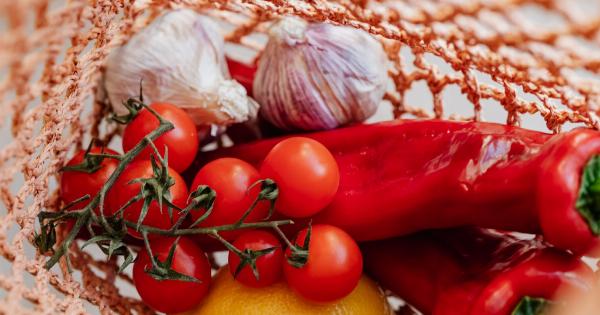Aging is a natural process that everyone goes through, but we all want to prolong our youthful looks and vitality as long as possible. Fortunately, there are many foods that can help us achieve this goal.
Here are 30 anti-aging foods that you need to try:.
1. Blueberries
Blueberries are packed with antioxidants, which fight free radicals that damage our cells and contribute to aging. They also contain vitamin C, vitamin K, and fiber. Add them to your smoothies, oatmeal, or yogurt for a tasty and healthy treat.
2. Kale
Kale is a superfood that is rich in vitamins A, C, and K, as well as calcium, iron, and antioxidants. It has anti-inflammatory properties and can help improve heart health and eyesight. Add it to your salads or smoothies for a boost of nutrition.
3. Salmon
Salmon is a great source of omega-3 fatty acids, which have anti-inflammatory properties and can help protect your heart, brain, and skin from aging. It also contains vitamin D, which is important for bone health.
Grill or bake it for a delicious and healthy meal.
4. Avocado
Avocado is a rich source of healthy fats, vitamins E and C, and fiber, all of which can help protect your skin and reduce signs of aging. It can be added to sandwiches, salads, or smoothies, or used as a spread on toast.
5. Olive oil
Olive oil is another great source of healthy fats and antioxidants. It can help reduce inflammation, improve heart health, and protect against age-related diseases. Use it as a dressing for your salads or as a cooking oil.
6. Green tea
Green tea contains catechins, which are powerful antioxidants that can help reduce the risk of cancer and heart disease, as well as improve brain function. It also contains caffeine, which can boost your metabolism and energy level.
Drink it hot or iced, with or without honey.
7. Dark chocolate
Dark chocolate contains flavonoids, which are antioxidants that can help improve heart health, blood flow, and cognitive function. It also contains caffeine and theobromine, which can boost your mood and energy level.
Just make sure to choose a high-quality dark chocolate with at least 70% cocoa content.
8. Turmeric
Turmeric contains curcumin, which is a powerful anti-inflammatory and antioxidant. It can help reduce pain, inflammation, and oxidative stress, as well as improve brain function and mood.
Add it to your curries, roasted vegetables, or smoothies for a spicy and healthy kick.
9. Broccoli
Broccoli is a cruciferous vegetable that is rich in vitamins C and K, fiber, and antioxidants. It can help reduce inflammation, boost immunity, and prevent cancer and heart disease. Eat it raw, steamed, or roasted, with or without garlic and olive oil.
10. Walnuts
Walnuts are a great source of omega-3 fatty acids, vitamin E, and antioxidants. They can help reduce inflammation, improve brain function, and lower cholesterol and blood pressure levels. Eat them as a snack, in a salad, or in a homemade trail mix.
11. Garlic
Garlic is a powerful antioxidant and anti-inflammatory that also has antibacterial and antiviral properties. It can help boost immunity, lower cholesterol and blood pressure levels, and reduce the risk of cancer and heart disease.
Add it to your soups, stews, or roasted meats and vegetables.
12. Beetroot
Beetroot is a root vegetable that is rich in vitamins C and K, iron, and antioxidants. It can help improve blood flow, lower blood pressure, and boost endurance and brain function. Eat it raw, roasted, or boiled, with or without goat cheese and walnuts.
13. Spinach
Spinach is a leafy green vegetable that is rich in vitamins A, C, and K, as well as iron, calcium, and antioxidants. It can help improve bone health, eyesight, and immunity, and reduce the risk of cancer and heart disease.
Eat it raw, steamed, or sautéed, with or without eggs and mushrooms.
14. Pomegranate
Pomegranate is a fruit that is rich in vitamin C, fiber, and antioxidants, especially punicalagins. It can help improve heart health, lower inflammation, and protect against cancer and Alzheimer’s disease.
Eat it as a snack, in a smoothie, or as a topping on your salad.
15. Quinoa
Quinoa is a grain that is rich in protein, fiber, and vitamins B and E, as well as antioxidants. It can help improve digestion, reduce inflammation, and support muscle growth and repair. Cook it as a side dish, in a salad, or as a breakfast cereal.
16. Sweet potato
Sweet potato is a root vegetable that is rich in vitamin A, fiber, and antioxidants, especially beta-carotene. It can help improve eyesight, immunity, and metabolism, as well as reduce inflammation and blood sugar levels.
Bake it, roast it, or mash it, with or without cinnamon and maple syrup.
17. Brazil nuts
Brazil nuts are a great source of selenium, which is an antioxidant that can help improve thyroid function, reduce inflammation, and increase immunity. They also contain healthy fats, protein, and fiber.
Eat them as a snack, in a trail mix, or as a topping on your salad.
18. Ginger
Ginger is a root that is rich in gingerol, which is an anti-inflammatory and antioxidant. It can help reduce pain, inflammation, and nausea, as well as improve digestion and brain function.
Add it to your tea, smoothies, or stir-fries, with or without honey and lemon.
19. Tomatoes
Tomatoes are a fruit that are rich in vitamin C and antioxidants, especially lycopene. They can help improve heart health, protect against cancer, and reduce inflammation. Eat them raw, roasted, or cooked, with or without basil and mozzarella cheese.
20. Cinnamon
Cinnamon is a spice that is rich in antioxidants and can help improve blood sugar levels, reduce inflammation, and boost brain function. It can be added to your oatmeal, smoothies, or coffee, with or without apples and nuts.
21. Almonds
Almonds are a great source of healthy fats, protein, fiber, and vitamin E, which is an antioxidant that can help reduce inflammation and protect against aging. Eat them as a snack, in a salad, or in a homemade granola.
22. Red wine
Red wine contains resveratrol, which is an antioxidant that can help improve heart health, reduce inflammation, and protect against cancer and Alzheimer’s disease.
It should be consumed in moderation, however, and not recommended for pregnant women, children, or people with alcohol dependency.
23. Carrots
Carrots are a root vegetable that are rich in vitamin A, fiber, and antioxidants, especially beta-carotene. They can help improve eyesight, immunity, and skin health, as well as reduce inflammation.
Eat them raw, roasted, or cooked, with or without hummus and dip.
24. Greek yogurt
Greek yogurt is a dairy product that is rich in protein, calcium, and probiotics, which are important for gut health and immunity. It can also help reduce inflammation and promote muscle growth and recovery.
Eat it as a snack, in a smoothie, or as a sauce or dip.
25. Oats
Oats are a whole-grain cereal that are rich in fiber, protein, and vitamins B and E, as well as antioxidants. They can help reduce cholesterol and inflammation, improve digestion and blood sugar levels, and support muscle growth and recovery.
Cook them as a porridge, in a smoothie, or in a homemade granola.
26. Mushrooms
Mushrooms are a type of fungi that are rich in vitamin D, selenium, and antioxidants, especially polysaccharides. They can help reduce inflammation, boost immunity and brain function, and protect against cancer and heart disease.
Eat them cooked, with or without garlic and olive oil, or as a supplement.
27. Oranges
Oranges are a citrus fruit that are rich in vitamin C, fiber, and antioxidants, especially flavanones. They can help improve immunity, protect against cancer and heart disease, and reduce inflammation and oxidative stress.
Eat them whole, as a juice, or in a salad or smoothie.
28. Lentils
Lentils are a legume that are rich in protein, fiber, vitamins B and E, and antioxidants. They can help improve digestion, reduce inflammation and blood sugar levels, and promote muscle growth and recovery.
Cook them in soups, stews, or salads, with or without spices and herbs.
29. Tea tree oil
Tea tree oil is an essential oil that has antiseptic, antimicrobial, and anti-inflammatory properties. It can help treat acne, eczema, dandruff, and other skin and scalp conditions, as well as reduce stress and anxiety.
Use it as a topical treatment, diluted with a carrier oil or added to your shampoo and body wash.
30. Water
Water is the simplest and most essential anti-aging food that we need to consume every day. It can help hydrate our cells, flush out toxins and waste, improve digestion and metabolism, and support all bodily functions.
Drink at least 8 glasses or 2 liters of water per day, or more if you are physically active or live in a hot or dry climate.




























